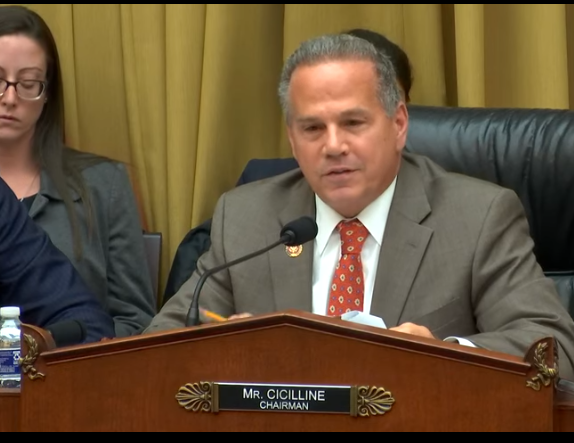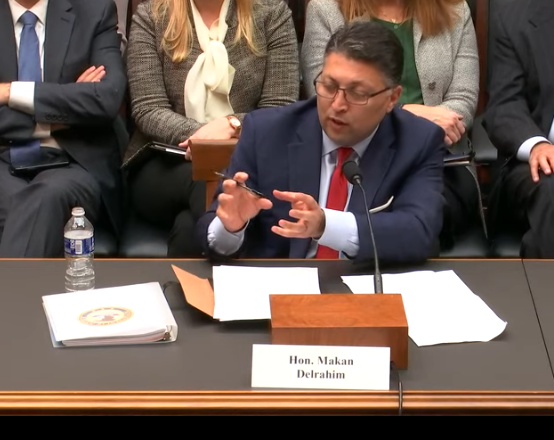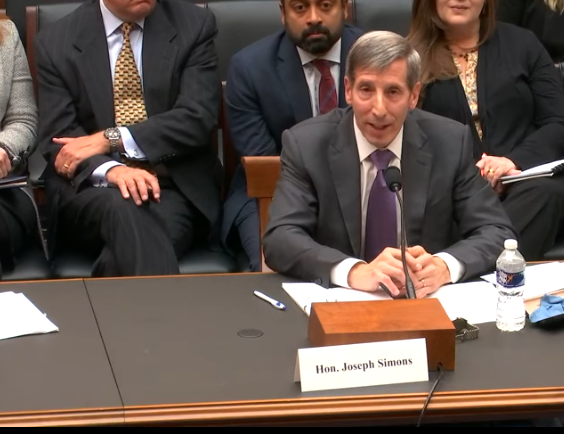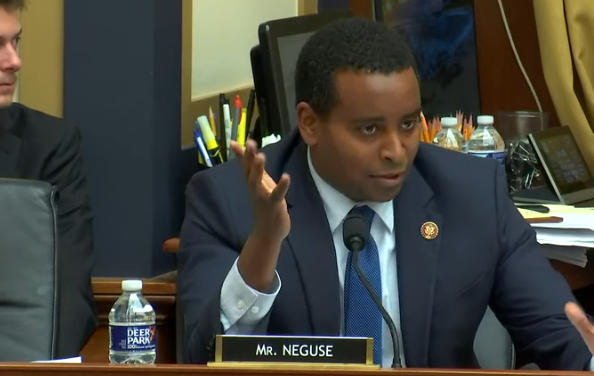“The last major monopolization case was brought in 2001 against Microsoft, Rep. Cicilline noted. “This has created a de facto antitrust exemption for online platforms.”

Rep.David Cicilline (D-RI)
The House Subcommittee on Antitrust, Commercial, and Administrative Law yesterday heard from Joseph Simons, Chairman of the Federal Trade Commission, and Makan Delrahim, Assistant Attorney General in the Department of Justice’s Antitrust Division, as part of the Subcommittee’s fourth hearing in its “Online Platforms and Market Power” series. The latest hearing focused on the perspectives of the antitrust authorities, while previous hearings have examined the effects of the big tech companies on innovation and entrepreneurship; online platforms’ effect on a free and diverse press; and the role of data and privacy in competition. While both Delrahim and Simons said they are aggressively investigating and monitoring dominant platforms like Facebook and Google, they warned against overreach.
Subcommittee Chair David Cicilline (D-RI) expressed his concern that, over the past decade, the largest tech firms have acquired more than 436 companies, “many of which were actual or potential competitors,” without intervention from antitrust enforcement authorities. The last major monopolization case was brought in 2001 against Microsoft, Cicilline noted. “This has created a de facto antitrust exemption for online platforms.,” he said, questioning whether the failure lies in the need for congressional action to amend and strengthen existing laws, a lack of agency resources to effectively combat the problem, or simply a lack of will to enforce the laws on the books.
Past and Ongoing Actions

Makan Delrahim
In his introductory remarks, Simons pointed to the FTC’s recent “notable actions to prevent anticompetitive mergers and conduct,” including 43 merger enforcement actions in the last two years, seven of which were in successful litigation. The FTC is now deepening its focus on the tech market, and earlier this year established a Technology Enforcement Division. The FTC is now actively investigating competition in the U.S. tech markets. Facebook recently announced that it is being investigated by the FTC as part of its second quarter earnings announcement.
Delrahim said that his Division is hard at work reviewing business practices by market-leading online platforms and noted that Facebook and Google have also publicly disclosed investigations by the Division. The Division is investigating Facebook, Google and Apple. “We’re focused on understanding how personalized advertising transactions work,” said Delrahim. “We’re concerned with the ways platform operators can manipulate conditions for competition. In some instances, operators may have the incentive to improve the platform for the benefit of all users. In others, the operator may also compete against users and may have an incentive to disadvantage or exclude competitors.” Delrahim pointed to the Division’s 2008 suit against Google and Yahoo! to stop an agreement that would have eliminated Yahoo! as an independent source of online search advertising as evidence of the Division’s commitment to keeping such powers in check.
Proceed with Caution
Representative Hank Johnson (D-GA) questioned Delrahim’s seemingly contradictory statements on the value of consumer data; last year, Delrahim said that data may not act as a barrier to entry in every case and should not be confused with price, while last week he likened large amounts of data to a new currency, said Johnson, who asked if Delrahim’s views had changed. “I stand by both statements,” Delarahim replied. “I don’t think you can directly correlate data with a market price because data has multiple dimensions to it. Usage data has a completely different value than user data.”
Both Delrahim and Simons seemed reluctant to advocate for harsher blanket measures against using data, partly based on results so far of the European General Data Protection Regulation (GDPR) model. In a response to Representative Jim Sensenbrenner (R-IL), for example, Delrahim and Simons each warned against mimicking the EU approach. Sensenbrenner recounted a recent trip to Berlin and Brussels in which he participated in talks on privacy and competition, where he expressed his fear that “the Europeans, led by the Germans, are attempting to use the GDPR as a way of forcing us to adopt their laws” and that the GDPR was “being used very subtly as a protectionist mechanism for European data platforms.” He added: “The EU GDPR has been designed to squeeze out competitors and help entrench large incumbents.”

Joseph Simons
Simons replied that, while the FTC has encouraged Congress to adopt federal privacy legislation, “we’re very concerned that adopting a program like the GDPR could do exactly the opposite of what we’re trying to do.” Simons echoed Sensenbrenner’s fear that such an approach could entrench large platforms at the expense of new entrants, chiefly by requiring opt-in consent, which he said consumers are likely to only provide to larger, consumer-facing, and more reputable platforms.
“We have to be very careful not to encourage protectionist policies on the part of our foreign competitors in the name of ‘antitrust enforcement’ or ‘privacy protection’,” Sensenbrenner added. “I agree we need to have a federal privacy law, but at the same time we have to very careful in making sure it’s limited to what we want to accomplish rather than having a lot of unintended consequences that hurt consumers on both sides of the Atlantic.”
Facebook-FTC Settlement
Subcommittee Vice Chair Joe Neguse (D-CO) brought up the FTC’s settlement with Facebook earlier this year, noting that many were “deeply disappointed with a $5 billion settlement.” Neguse pointed out that Facebook generated $65 billion in revenue just last year, so the settlement amounts to about a month’s worth of revenue. Simons clarified that it accounted for 23% of Facebook’s profits for that year, and added that he was disappointed that the members of the Subcommittee were disappointed. “I think what we did was a terrific outcome for consumers,” Simons said. “It stands as very aggressive and much more than anything anyone else around the world has done—in fact, if you took all of the enforcement actions from all of the privacy authorities around the world and combined them, you wouldn’t even come close.”

Rep. Joe Neguse (D-CO)
Other representatives, including Johnson and Cicilline, also expressed concerns about the Facebook settlement’s effect of releasing Facebook from liability for certain practices, as well as process issues, such as the FTC’s decision not to depose Mark Zuckerberg or Chief Operating Officer Sheryl Sandberg.
Importantly, said Simons, even if the Commission had wanted to do more in the Facebook case, it does not have the authority to impose fines on its own or to increase injunctive relief. “We have to go to court, and it would have taken several years to go to court,” he said.
This point became one of the key takeaways form the hearing—that the FTC may need more authority from Congress to effectively combat anticompetitive abuses in the age of Big Data. “The tools that the FTC has under existing statute could be strengthened, and I would think that given the trends and challenges your agency faces, that this committee could provide some leadership on that front,” Neguse said.
Simons later added: “You have a hundred-year old statute on the privacy side that does not anticipate the issues we have today. If you want us to do more on the privacy front, we need help from you. We’re doing what we can with the tools we have. You need to give us the authority.”
The Data Privacy Conundrum
In exchanges with Representative Kelly Armstrong (R-ND), both Simons and Delrahim also cautioned against passing a blanket rule that would force companies with large repositories of “non-rivalrous” data to share the data with smaller companies. Simons questioned what the incentive would be to create the data in the first place if companies were forced to duplicate it for free, while Delrahim said “we should be wary about doing that.”
Armstrong also asked both witnesses to address the tension between the consumer benefits provided by artificial intelligence and machine learning and privacy concerns. “How do we approach large collection of data in the sense that it harms consumers or is used anticompetitively but also can benefit consumers?” he asked. Both men agreed that Congress should be very careful not to eliminate potential consumer benefits by taking a blanket approach, rather than assessing situations on a case-by-case, fact-specific basis, which Armstrong expressed frustration over. “That’s our problem; at some point we have to draw some kind of bright line laws,” he said. “Reasonableness can vary very significantly depending on who’s hearing the case, and it’s hard to continue to build a company or to start innovation if your sole basis is “well we’ll cross that bridge when we get there.” Simons said the FTC will soon be publishing guidelines to give the private bar and business community a better sense of what constitutes the line.
Merger Moratorium?
Before he concluded the hearing, Cicilline asked Delrahim about Google’s announcement that it would seek to make a number of data-driven acquisitions, including of Fitbit and Looker, despite recent scrutiny by state and federal enforcers. Cicilline asked Delrahim if his Subcommittee should consider a “merger moratorium” for dominant platforms like Google until the various investigations into their practices have been completed.
“By doing that, we might risk harming consumers, because there could be mergers and transactions that could be pro-competitive,” Delrahim said.

![[IPWatchdog Logo]](https://ipwatchdog.com/wp-content/themes/IPWatchdog%20-%202023/assets/images/temp/logo-small@2x.png)

![[Advertisement]](https://ipwatchdog.com/wp-content/uploads/2024/04/Artificial-Intelligence-2024-REPLAY-sidebar-700x500-corrected.jpg)
![[Advertisement]](https://ipwatchdog.com/wp-content/uploads/2024/04/Patent-Litigation-Masters-2024-sidebar-700x500-1.jpg)

![[Advertisement]](https://ipwatchdog.com/wp-content/uploads/2021/12/WEBINAR-336-x-280-px.png)
![[Advertisement]](https://ipwatchdog.com/wp-content/uploads/2021/12/2021-Patent-Practice-on-Demand-recorded-Feb-2021-336-x-280.jpg)
![[Advertisement]](https://ipwatchdog.com/wp-content/uploads/2021/12/Ad-4-The-Invent-Patent-System™.png)






Join the Discussion
6 comments so far.
PTO-Indentured
November 21, 2019 11:40 amAntitrust – perfectly defined
Big Tech to campaigning polititions hungering for biggest of ‘donations’: change the U.S. patent system (to so favor us) — to one U.S. independent inventors can place no trust in.
Jam
November 15, 2019 06:35 pmSeems like one of the best checks to prevent a tech oligarchy was a patent system that was friendly to small inventors, allowing them to stake out and defend their ideas against deep pocketed individuals and corporations.
Then the US took a dramatic turn with the AIA, Mayo/Alice, Ebay, etc. to make the patent system hostile to small inventors. No deep pockets? No patent for you.
Model 101
November 15, 2019 01:47 pm“This has created a de facto antitrust exemption for online platforms.,” he said, questioning whether the failure lies in the need for congressional action to amend and strengthen existing laws, a lack of agency resources to effectively combat the problem, or simply a lack of will to enforce the laws on the books.
“….lack of will to enforce the laws on the books” Laws are for the little people, not Big Tech.
“….lack of will” The politicians are fat and drunk on Big Tech money, it’s not a lack of will!
Pro Say
November 15, 2019 12:44 pmad @ 2: “Amazon will soon deliver your food, drinks and gadgets (nobody needs books anymore), entertain you and your family, nurture your babies and provide you with affordable prefabricated housing”
If Congress doesn’t stop Amazon, yes they will.
And though it will be arriving a few decades late, we’ll all finally be living in George Orwell’s world of 1984.
angry dude
November 14, 2019 10:25 pmPro Say @1
Dude,
Why ??
Amazon will soon deliver your food, drinks and gadgets (nobody needs books anymore), entertain you and your family, nurture your babies and provide you with affordable prefabricated housing
This is an American Dream
Pro Say
November 14, 2019 07:21 pmGiven their large and ever-growing infection in our American lives — and indeed populations the world over — the only cure for this Big Tech / FAANG cancer can be summed up in just three words:
Break. Them. Up.